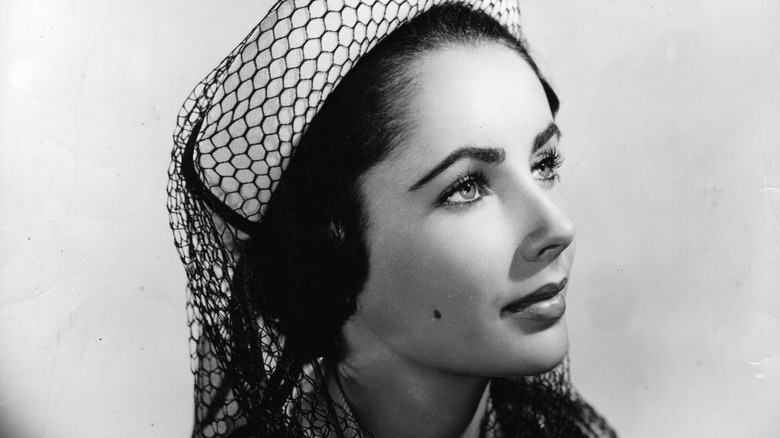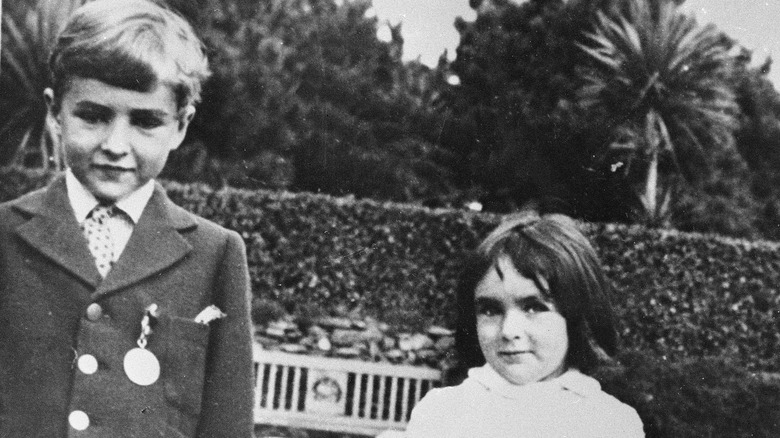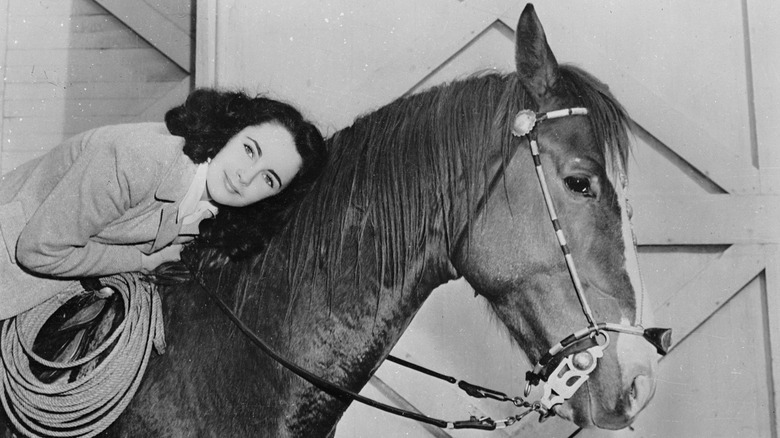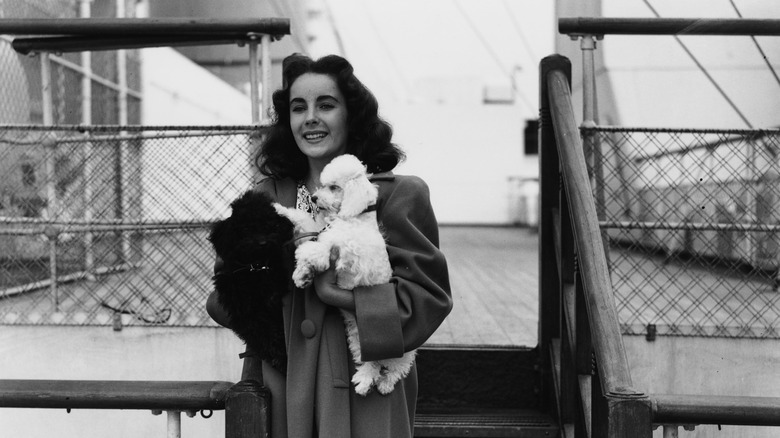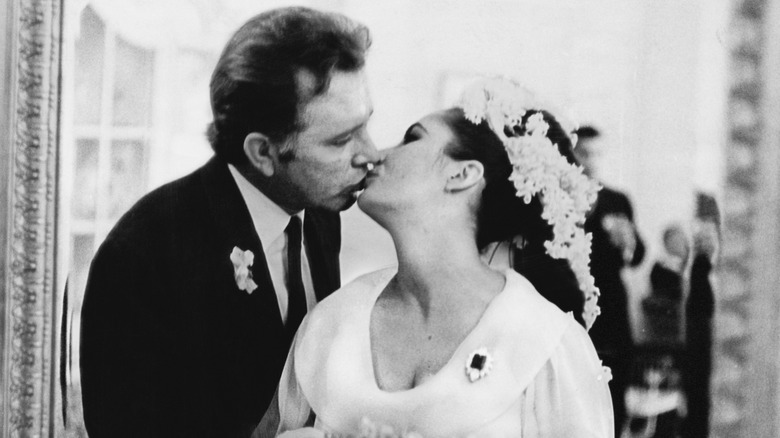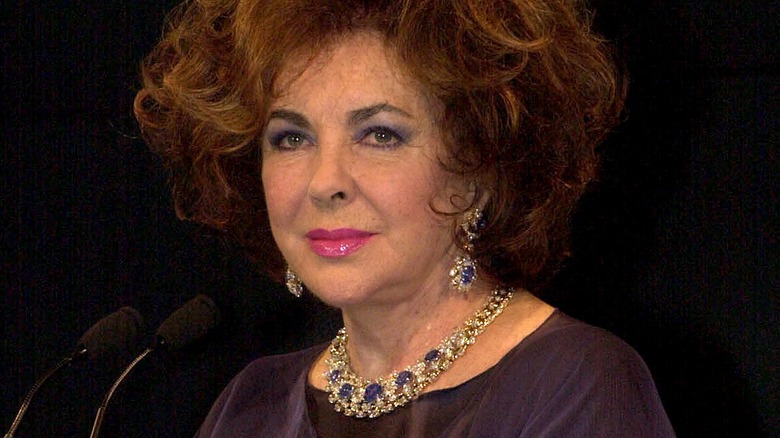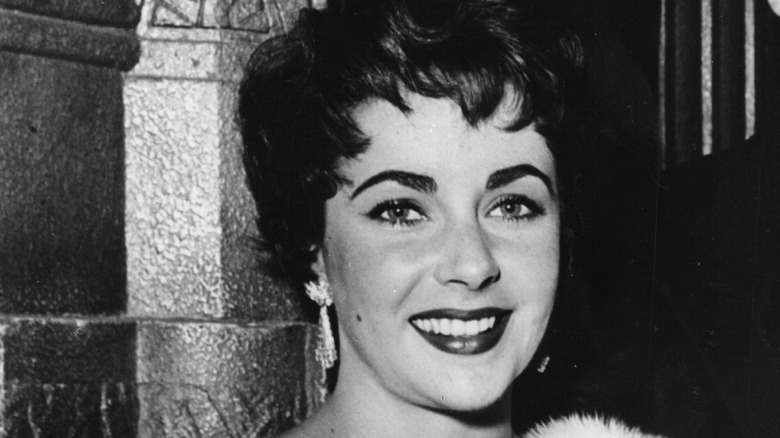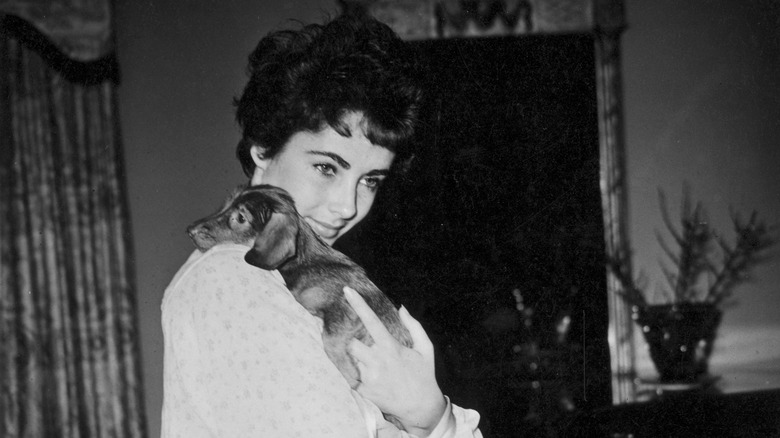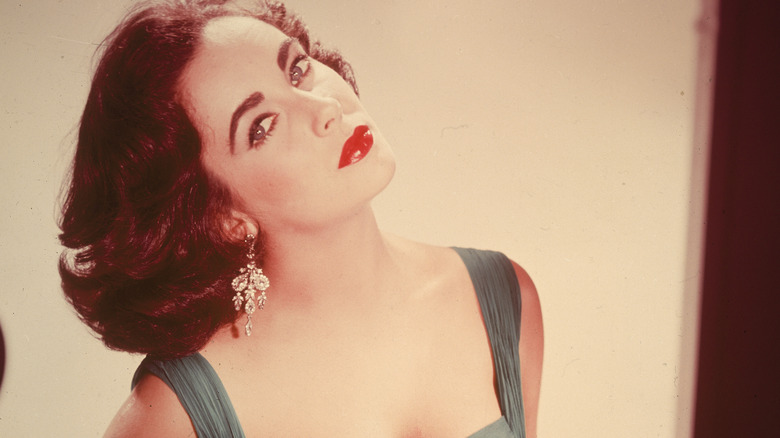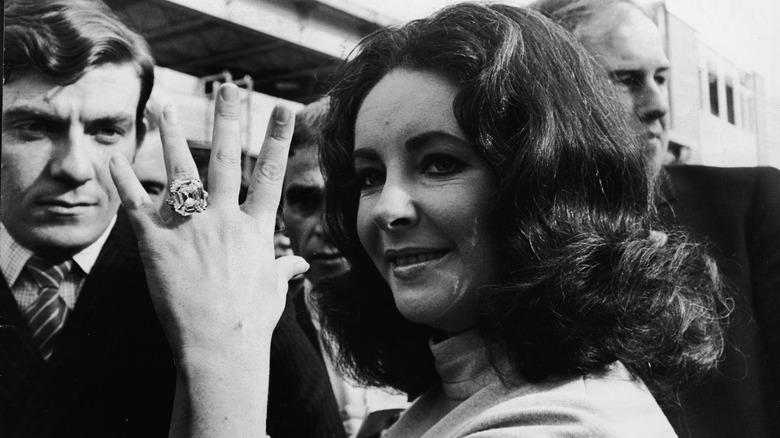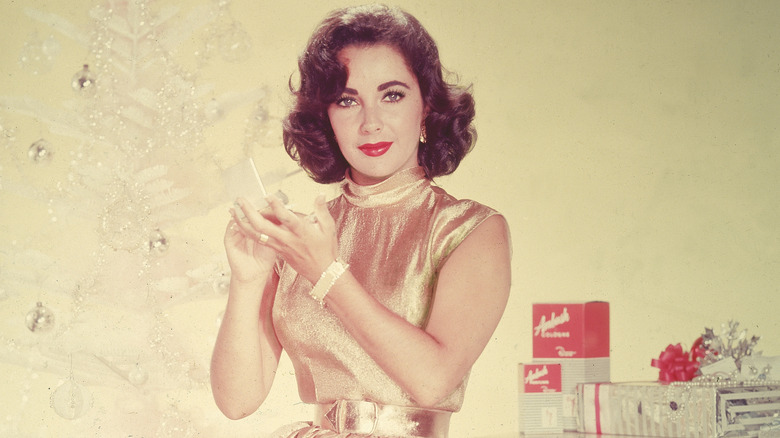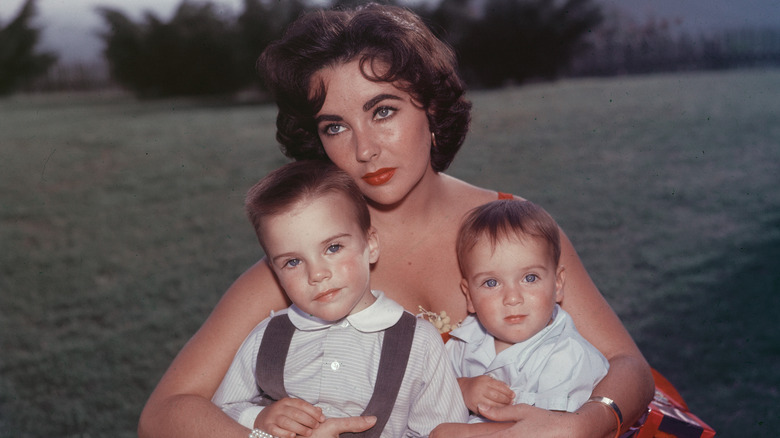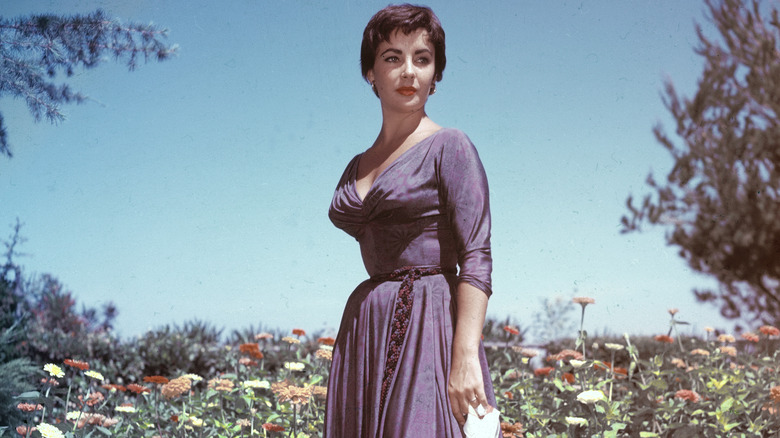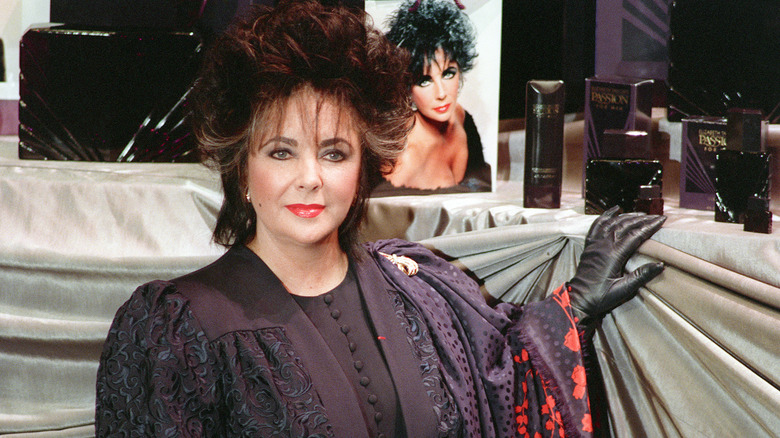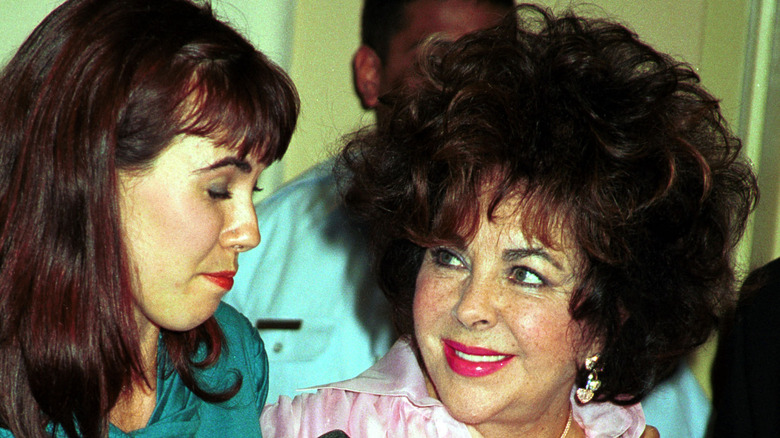The Untold Truth Of Elizabeth Taylor
We may receive a commission on purchases made from links.
Elizabeth Taylor, one of the most beloved actresses of all time, is a star who will never forgotten. Although she passed away in 2011, the impact she had on the world is still reverberating. Born in 1932, the violet-eyed actress charmed generations of fans and starred in some of the most memorable films in history, including Cat on a Hot Tin Roof and Who's Afraid of Virginia Woolf?. In addition to being a successful, Oscar-winning actress, Taylor was also a celebrated philanthropist who tirelessly fought to help those suffering from AIDS and worked to fund research for a cure.
The British-born star was made Dame Commander of the Order of the British Empire in 2000 in recognition of her significant influence. She led a fascinating life marked by hardship and strategy, but all of it served to harden her resolve and work ethic. While she is still remembered for her films, many people don't realize that Taylor was far more than a stunningly beautiful star, but was also a passionate and witty woman. The real Dame Elizabeth Taylor is even more remarkable than most people realize.
An abusive father contributed to Elizabeth Taylor's unhappy childhood
Elizabeth Taylor's childhood was an unhappy one. She began acting when she was just 9 years old, and being thrust into the spotlight only served to incite the anger of her father. "When I was a little girl, my father was abusive when he drank and seemed to like to bat me around a bit," she told Barbara Walters in a 1999 interview for ABC (via SFGate).
Taylor said that she later made peace with her father's abuse after she had left home and had children of her own. "I started thinking about my father and how it must have felt for him to have his 9-year-old daughter making more money than he was... when he had been this very proud, beautiful, dignified man," she said. "I don't blame him... he was drunk. I know he didn't mean to do it. He didn't know what he was doing."
Elizabeth Taylor said she was "used from the day [she] was a child"
Before she was even in her teens, Elizabeth Taylor had become a successful Hollywood star. But fame was far from idyllic for the young actress. Instead of enjoying her new career, Taylor was made miserable by the film studio. "I was nine when I made my first films in Hollywood," she told Rolling Stone. "I was used from the day I was a child, and utilized by the studio. I was promoted for their pockets."
One incident in particular stuck in Taylor's memory. MGM co-founder Louis B. Mayer, one of the most influential people in the early days of Hollywood, began screaming at Taylor's mother, saying, "I took you and your f***ing daughter out of the gutter." Taylor defended her mother. "I uttered my first swear word and told him that he didn't dare speak to my mother that way, and he and the studio could both go to hell, and that I was never going to go back to his office," she said. She was just 15 years old at the time.
Elizabeth Taylor claimed she never had any acting lessons
After her death, Elizabeth Taylor remains one of the most iconic actresses in Hollywood history. Her legendary beauty and prodigious acting talent had captivated generations of fans. Taylor's talent was innate, and the star didn't have any formal training in her craft. Instead, she honed her skills by watching others. "I have never had an acting lesson in my life," she told Rolling Stone. "But I've learned, I hope, from watching people like Spencer Tracy, Marlon Brando, Montgomery Clift, Jimmy Dean — all people who were finely tuned and educated in the art of acting. They were my education."
Taylor was determined to grow as an actress and not be molded by directors, saying she did her "best work by being guided, not by being forced." She added, "If you describe me as an actress, you'd have to say that I wasn't a distinctive actress as actresses go, because I'm certainly not a polished technician."
A hopeless romantic, Elizabeth Taylor was married eight times
Elizabeth Taylor had seven husbands in total, but had eight weddings as she married and divorced her fifth husband, Richard Burton, twice. Many think Burton, her fifth husband, was the great love of her life. While she described him as just one of her soulmates, along with another husband, Mike Todd (the only husband Taylor didn't divorce, but who tragically died in a plane crash), Taylor did remain fond of Burton long after their divorces and continued to wear a 33-carat diamond ring he had given her.
She described herself as a romantic who was willing to change herself to make her husbands happy. In an interview with Harper's Bazaar in 2006 she was asked if she thought women dress for themselves, other women, or men, Taylor answered, "I think men," saying that she thought of pleasing men when she got dressed. "Why not please someone you love?" she said.
As a politician's wife, Elizabeth Taylor wasn't allowed to wear purple
Elizabeth Taylor might have been willing to change parts of herself (or at least her appearance) for her husbands, but not at the cost of sacrificing her own sense of self. Her seventh husband, John Warner, was a politician, and Taylor went into semi-retirement after marrying him, settling into the life of a politician's spouse. Being a senator's wife was quite different from being a Hollywood star. "Washington is the hardest town for a woman in the world — especially if you're married to a politician," Taylor told POZ. "If the woman is the politician, then it might be quite different. But if you're wedded to the politician, it's like your lips are sealed. You are a robot."
While on the campaign trail, Taylor was forbidden from wearing purple "because it smacked of royalty." Taylor followed the rule for two months. "But then, after the election, the Republican women gave a luncheon in my honor for all that I had done for the campaign, and I put on my purplest Halston pantsuit," she said.
Elizabeth Taylor was deeply spiritual and converted to Judaism
"I am deeply, privately spiritual," Elizabeth Taylor told POZ in 1997. "I've always been interested in spiritual things." Taylor was captivated by Kabbalah, an ancient Jewish tradition of mysticism, although she made it clear that this was a spiritual pursuit, and not a religious one. "Kabbalah is not conformist," she said. "You don't have to be Jewish to believe in it. It's not a religion. It coincides with many of my beliefs."
She was not against organized religion, however. She grew up in the Christian Scientist faith, although she converted to Judaism after the death of her third husband, Mike Todd. "I needed — after Mike's death — some very strong faith to keep me alive, something to hang on to," she said on CNN's Larry King Live. "I didn't find it in Christian Science. And I wanted to be close to Mike. So I studied Judaism for a year after his death, and then converted."
Animals were some of Elizabeth Taylor's best friends
Elizabeth Taylor's first major role was in the 1944 film National Velvet, in which she played a horse-loving girl who disguises herself as a jockey. Her affection for horses required no acting at all — Taylor had an affinity for animals and had been around horses since she was a little girl. "I've always preferred animals to little girls or boys," she told Rolling Stone. "I had my first horse — actually it was a Newfoundland pony — when I was three, and I loved riding, without anyone shackling me — riding bareback as fast as I could."
Taylor had many pets throughout her life, and even had monkeys in her home while living in Africa. Towards the end of her life, Taylor had a Maltese dog named Sugar who accompanied her everywhere. "I've never loved a dog like this in my life," she told W in 2004. "It's amazing. Sometimes I think there's a person in there."
Scoliosis caused Elizabeth Taylor chronic back pain since childhood
Perhaps one of the greatest tests of Elizabeth Taylor's talent was concealing the chronic pain she lived with for most of her life. She was born with scoliosis, a condition which curves the spine. Her condition grew progressively worse as she grew older, but Taylor maintained a sense of humor about the pain that became a constant companion. "I was born with it, but it has finally caught up with me," she told W in 2004. "My body's a real mess. If you look at it in the mirror, it's just completely convex and concave. I've become one of those poor little old women who's bent sideways. My X-rays are hysterical. The bone doctors just throw up their hands and say, 'Sorry, there's nothing we can do!' Which is so cheery."
She joked about the fact that she was still going strong in her 70s. "People must think, 'My God, she's still alive?'" she said. "But there's some resilience in me that makes me keep fighting. It's the damnedest thing — I just keep coming back."
Jewelry was one of Elizabeth Taylor's greatest passions
Today, Elizabeth Taylor is remembered for embodying the glitz and glamour of the golden age of Hollywood. A jewel of cinematic history, she added to her own dazzling charm by decorating herself with expensive jewels. Jewelry was one of her big passions in life, and she collected spectacular pieces of jewelry in addition to designing her own line. She even authored a book called My Love Affair with Jewelry in 2002 to commemorate her love for priceless baubles. "[Jewelry] doesn't belong to me; I'm just its keeper," she told Michael Kors, who interviewed her for Harper's Bazaar.
Considering how much she loved to drape herself with jewels, it's no surprise she had trouble when Kors' asked her to identify three jewelry staples every jewelry-lover should have. Of course, Taylor couldn't stop at just three pieces. "Start with a glamorous ring and earrings, I'd say," she said. "They are the basics for me." She would also add "A pair of long, drippy chandelier earrings... A beautiful pin... Or a necklace. Oh God, I also love bracelets."
"I find being 'Elizabeth Taylor' really boring"
By 1997, Elizabeth Taylor had been a legend for decades. Her status as a cultural icon was secure, and she was in a position to retire on her vast wealth and enjoy the fruits of fame if she wished. Instead, she threw herself into AIDS advocacy, becoming the founding chair of American Foundation for AIDS research and then going on to form the Elizabeth Taylor AIDS Foundation. She traveled all over the world to educate people about the disease, feeling an urge to create a lasting impression on the world beyond her films.
"I find being 'Elizabeth Taylor' really boring," she told POZ, explaining why she was so focused on her advocacy work. "I think if you were born with privileges — or given privileges — then you should share them. Like money — it's to share. I've known too many people who just sat and hoarded and were miserable. Just miserable SOBs. I have always believed that giving is one of the reasons that we were put on this earth. I've acted on that belief since I was old enough to leave my nest."
Elizabeth Taylor resented the way the media portrayed her
Most famous people find themselves the subject of tabloid fodder at some point in their lives, but the public's fascination with Elizabeth Taylor was seemingly never-ending. Her long and prolific career, along with her turbulent personal life, made her a frequent media target. Taylor resented how the press handled her image, and said that she was far different from how she was portrayed in the news.
"I'm not some strange kind of coiled person," she told Playbill in 1981. "I guess interviewers need a handle and for some reason — don't ask me why — they like to make me sound off-putting. But I learned very, very young that the minute you start believing your own publicity, you're in a world of trouble. So I take the hubbub surrounding my life with a dose of salts, a big dose."
She credited her parents with keeping her grounded. "The problem is that the media have made my life out to lack dignity by not allowing me the privacy I require and by fabrication," she said.
Elizabeth Taylor said she was "the biggest manipulator of all time"
Elizabeth Taylor was a force of nature. Even in childhood, she was quick to assert her independence and live life on her terms. The actress told Rolling Stone that she had always been the type to defy authority. "My nanny, for instance, was horrible!" she said. "Her name was Frieda Edith Gill... I think she was probably very sweet, and I was rude in my rebellion. But I had my own identity and I probably was the biggest manipulator of all time. I got my own way so cunningly. ... Yeah, I was probably the biggest manipulator ever born!"
Her independent streak was just one facet of what she considered to be her most important quality: passion. Taylor always threw her whole self into whatever she did. "I'm not fascinated by things," she said. "I dive into them. One is fascinated by fire. But when I was a toddler and crawling, I was so fascinated by it that I reached out and touched it. That's the difference between fascination and passion for me."
Elizabeth Taylor never had any interest in retiring
Even though she worked for most of her life, starting her acting career while still a child, Elizabeth Taylor never slowed down. She kept acting long after people thought she would have retired, and spent her later years working as an AIDS activist even in the face of her own declining health.
In 1981, then in her late 40s, Taylor made her stage debut in a revival of The Little Foxes. She had more than 50 films under her belt, two Oscars, and was busy in politics as the wife of Senator John Warner, but decided to turn her skills to theater simply because she could. "I'm well enough off not to have to work," she told Playbill. "No one has a gun at my head. But I act because I like it."
Taylor was adamant that it was her love of acting that kept her driven rather than a desire to stay relevant and prove herself. "I have a very sound ego, I think," she said. "I don't have to go out fighting windmills or trying to prove things. Certainly not to other people. That would be a waste of energy."
Elizabeth Taylor's tireless AIDS advocacy lives on in her granddaughter
While she is remembered by most of the world as an elegant and timeless movie star, Elizabeth Taylor's legacy extends far beyond her acting work. The impact she had on the world is immeasurable, and it continues today. Her granddaughter, Naomi deLuce Wilding, is continuing her AIDS advocacy. "My grandmother was a huge, iconic, unforgettable star, and I'm just a person, but I really want to do whatever I can to continue her work," she told The Telegraph. "The best lesson she taught my cousins and siblings and I, was to use whatever skills we have to help others. God knows she used what she had to huge effect."
Wilding said that her grandmother had always lived life to the fullest and wasn't ready to die, especially as she felt she still had work to do. While Taylor never asked her grandchildren to carry on her work, Wilding is committed to helping fulfill her grandmother's dream: spreading awareness and finding a cure for AIDS. "She taught us by example to help others," she said.
